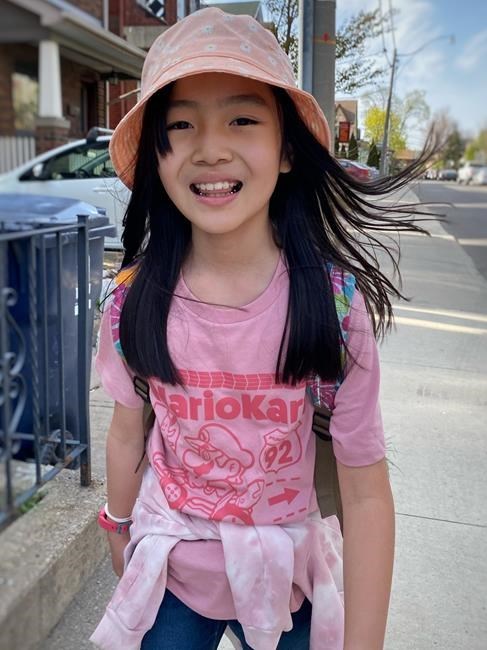TORONTO ŌĆö Thousands of 91įŁ┤┤ children return to the classroom this week for their fourth pandemic school year, eager for a semblance of normalcy after years of upheaval that many families fear is not over yet.
Students in most parts of the country resume class Tuesday or Wednesday, although Saskatchewan and Alberta reopened doors last week. Largely common among the return is the absence of many COVID-19 restrictions ŌĆö by-and-large, masks are optional, signed screening sheets are gone and in-person lessons trump remote options.
Still, uncertainty dominated Sophia RoperŌĆÖs back-to-school prep as she took her 11-year-old granddaughter Jazmine clothes shopping last week, and she expressed frustration over a lack of mask mandates and seemingly conflicting public-health advice from Ontario's top doctor, Kieran Moore.
"(He) said the fall is coming and everyone is going to be indoors ŌĆö watch out. (But) you're telling the people, 'OK, we're removing the mask mandate,'" said Roper, who was among the minority of shoppers wearing a mask at a Toronto mall.
"And they say now we're going to see spikes.... People are confused. People are at a point where they say, 'You know what? I'm just going to do whatever I want to do.'"
Confusion for many Ontario families intensified in recent days when Moore said people who test positive for COVID-19 no longer need to isolate for five days and can return to work or school if symptoms improve for at least 24 hours.
Moore said people should wear a mask for 10 days after the onset of symptoms, which, in combination with up-to-date vaccinations should offer ŌĆ£a more pragmatic and practical approach...with the least disruption that we can have in the school and work environment.ŌĆØ
It brings the province in line with several others that have dropped the isolation requirement ŌĆö including Saskatchewan and Manitoba in March, Alberta in June and Nova Scotia in July ŌĆö although health officials still recommend five days of self-isolation.
However, critics including two major teachers' unions have pushed back, fearing that dropping the mandate could still send contagious children and educators back to the classroom ŌĆō leading to more spread, and more disruption.
ItŌĆÖs certainly a concern for 10-year-old Lauren Tran, who said sheŌĆÖs taken COVID precautions all summer and expected to cover her face when she starts Grade 5 on Wednesday in Toronto. SheŌĆÖs already talked to friends and knows she wonŌĆÖt be the only one covering her face.
Still, Tran acknowledged that many kids ditched masks over the summer as warm weather enabled safer outdoor gatherings, and she wondered if they would put them back on if they donŌĆÖt have to.
ŌĆ£Last year (at school) was pretty good ŌĆō only, like, one or two people stopped wearing masks. But I'm kind of scared this year,ŌĆØ admits Tran, who caught the virus last spring and says ŌĆ£itŌĆÖs not fun at all.ŌĆØ
ŌĆ£A lot of kids don't wear masks anymore. So I'm a little bit nervous but I know it's their personal decision and I respect it."
Saskatoon mom and pediatrician Dr. Ayisha Kurji said she saw a mix of masked and unmasked kids waiting to enter the building during school drop-off last week.
Kurji advised families to equip kids with whatever mask they can tolerate for the entire school day, recognizing that cost is a barrier to many. She preferred well-fitting surgical and N95 masks to reusable cloth masks.
"COVID isn't over. We know that. We know we should be preparing for potential cases to increase in the fall when we all go inside,ŌĆØ said Kurji, assistant pediatrics professor at the University of Saskatchewan.
ŌĆ£We know that spread is higher inside. We know that masks work. We know that hand washing helps, and we know that if you're sick, you should stay home. So even if the mandates aren't there, the lessons haven't changed."
The ongoing debate over whether or not to wear masks is likely to continue in classrooms and among students, said Kurji, and she encouraged parents to discuss with their kids ways to be respectful when opinions clash.
She said her advice to her own nine- and 12-year-old was: "Don't ask why they're not masking. If it comes up in conversation or if they ask you, keep it to a brief, 'I feel safer this way.' Or ŌĆō if you need to ŌĆō say, 'My mom makes me,'ŌĆØ she chuckled.
Fifteen-year-old Jayda Vitorio said she did not like wearing a mask when it was required during the last school year and doesn't expect she'll wear one when she starts Grade 10 this week at her Catholic school in Toronto.
She said she looked forward to a somewhat normal year that will also get rid of a controversial ŌĆ£quadmesterŌĆØ system that had her sitting in extra-long classes.
Meanwhile, VitorioŌĆÖs mom Helen said sheŌĆÖs looking forward to Jayda getting a chance to better socialize with friends without the added barrier that masks impose.
"I want my daughter to be free. I want her to start dating. Not, you know, being afraid of close contact," said Vitorio.
"I don't want her having cold relationships with people. I want her to have a normal life, like I led. I want her to meet friends, hold a person's hand and not be afraid of getting close."
Vitorio said three years of the pandemic should have sufficiently taught students how to keep safe through hand hygiene and other precautions.
She said she believes COVID-19 is here to stay, and that means finding the right balance between living life and mitigating risk.
ŌĆ£It's like the flu. Some of us are going to get it, some aren't. And I think we just have to learn to live with it and accept that it's the new norm.ŌĆØ
This report by The 91įŁ┤┤ Press was first published Sept. 4, 2022.
Cassandra Szklarski, The 91įŁ┤┤ Press



